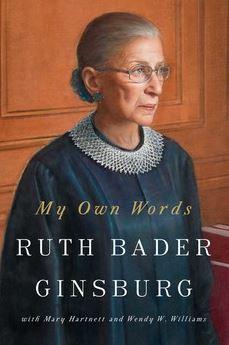Ruth Bader Ginsburg on Supreme Court vacancy, doing job "full steam"
As a young litigator, Ruth Bader Ginsburg argued cases that transformed the Supreme Court’s view of gender equality. In 1993, she became the second woman justice appointed to the nation’s highest court. She is known as much for her candor as for her unlikely friendship with conservative Justice Antonin Scalia who died in February.
As she releases her new book, “My Own Words,” published by Simon & Schuster, a division of CBS, Ginsburg sat down for a conversation with “CBS This Morning” co-host Charlie Rose about her past and vision for the Supreme Court’s future.
Charlie Rose: Whoever becomes president will have, when they arrive in the White House, an opportunity to appoint a new Supreme Court justice.
Ruth Bader Ginsburg: That’s one scenario. Another possibility is after the election, the Senate will act.
Rose: What would you like to see the Senate do?
Ginsburg: Well, [laughs] I would like to see the court have a full house by the time this term ends.
Rose: You’d like to see the court have a full house -- before this term ends, yes.
Ginsburg: Have nine members. Yes.
Rose: No thought of retiring?
Ginsburg: I have said that I will hold this office as long as I can do the job full steam.
Rose: And you’re doing it full steam.
Ginsburg: So I know that this year I’m okay. At my age, I’m 83, you have to take it year by year.
Rose: Many people, you know, have been fascinated by the fact that Ruth Bader Ginsburg and Antonin Scalia were friends. We all know that you both loved opera. You have told me when we talked in your chambers that he was a better singer than you are.
Ginsburg: He was a much better singer. Justice Scalia had a very good tenor voice. I am a monotone.
Rose: Do you miss him on the court?
Ginsburg: Of course I do. It’s--
Rose: Because?
Ginsburg: It’s a paler place without him. He had an uncanny ability to make even the most somber judge smile.
Rose: When you came to the court, Sandra Day O’Connor was your good friend.
Ginsburg: Yes.
Rose: And when she left, you said that was a turning moment.
Ginsburg: When Sandra left, it was a very lonely place for me to be. That is, the perception of the court, we come, sit on the bench and there’s the audience of spectators. And they saw eight rather well-fed men up there, and then there was this small, little woman. It was the wrong perception.
Rose: Yeah, exactly.
Ginsburg: I mean that’s over 23 years, so I sit, by seniority, close to the middle. Justice Sotomayor is on now my left side. Justice Kagan on my right side. We are 1/3 of the court. And my newest colleagues are not shrinking violets. They take a very active part in the colloquy that goes on at oral argument.
Rose: This is the first book you have written since being a justice of the Supreme Court.
Ginsburg: Yes. Not the first book ever. The first book was the bestseller called “Civil Procedure in Sweden.”
Rose: [Laughs] I missed that one. But you’ve always been interested in procedure.
Ginsburg: Yes. I taught procedure for 17 years.
Rose: When did this love affair with the law-- how did it begin?
Ginsburg: My interest in becoming a lawyer was sparked in the 1950s when I was a student, an undergraduate student, at Cornell. It was the heyday of Sen. Joe McCarthy. It was not a good time for our country. My professor of constitutional law brought to my attention the lawyers that were appearing before the people, called before the committees. Lawyers who reminded Congress we have a First Amendment and we have a Fifth Amendment.
Rose: You saw the law as a protector of individual liberty?
Ginsburg: Yes. Yes. I thought it could be a way to make a living plus to do something that will-- would make conditions in your society a little better.
Rose: There was another student at Cornell who decided to become a lawyer too.
Ginsburg: Yeah, my dear husband. Yeah.
Rose: Your dear husband.
Ginsburg: Yeah. In fact we had decided that whatever we do, we do it together. Marty was-- started out as a chemistry major, but his true major was golf. And the labs were in the afternoon, interfered with golf practice. So then it was either business school or law school.
Rose: You were at Harvard, and you transferred to Columbia.
Ginsburg: Yes.
Rose: Both great law schools, but why transfer?
Ginsburg: Marty was one year ahead of me. He had had his first year at Harvard and then was called into service. My daughter was three years old and I didn’t want to be a single mom. So I left Harvard.
Rose: And Harvard didn’t give you a degree. And then--
Ginsburg: Not then.
Rose: Marty comes to you, though, and says, “Don’t go back and accept anything from Harvard unless they’re willin’ to give you an honorary degree.”
Ginsburg: Which I received in 2011.
Rose: And there’s a picture in your chambers of you and Placido Domingo, and he’s singing to you in the red Harvard graduation robes.
Ginsburg: Yes.
Rose: And your title for that picture is what?
Ginsburg: “Woman in Ecstasy.” That’s me.
Rose: Thank you for this time. I’ve enjoyed it very much.
Ginsburg: I did too.
